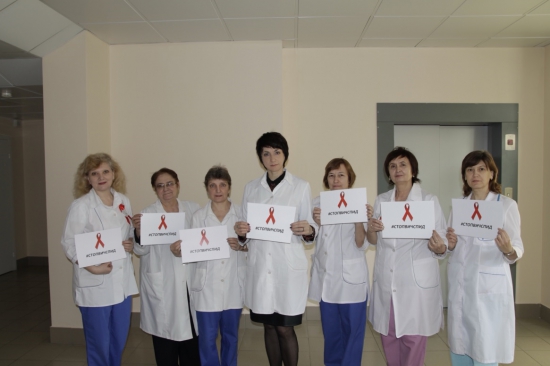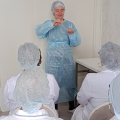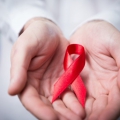|
30 11.2020
World AIDS Day is celebrated annually on December 1. In 2020, the theme for World AIDS Day this year is “International Solidarity, Shared Responsibility”.
|
World AIDS Day is celebrated annually on December 1. People around the world unite to demonstrate support for people living with HIV or in one way or another affected by HIV infection. In 2020, the world's attention is focused on the COVID-19 pandemic and its impact on the lives and well-being of people. This pandemic has shown once again how closely health is linked to other critical issues such as tackling inequality, human rights, gender equality, social protection and economic growth. That is why the main theme of the World AIDS Day this year is “International Solidarity, Shared Responsibility”.

COVID-19 has clearly demonstrated that in any pandemic, everyone's safety depends on everyone's safety. To be successful, you need to provide help to all who need it. Eradicating stigma and discrimination, taking into account the interests of the population and adopting approaches based on human rights and gender equality are the main conditions for ending the HIV and COVID-19 pandemics.
The COVID-19 pandemic, in particular, has exacerbated the already serious challenges facing people living with HIV, women, children and key populations. This includes, among other things, the problems associated with receiving vital medical care. This fact may be some opportunity to change the situation for the better through joint efforts. In many ways, ending AIDS as a public health threat depends on whether the world can cope with the COVID-19 pandemic.
Another important factor in the fight against COVID-19 is the active involvement of both the population and the political will of each individual country. Governments, donors, spiritual leaders, civil society and, finally, each of us should all contribute to the health of the world's population.
That is why, as part of World AIDS Day, UNAIDS is calling on countries to step up efforts to strengthen their health systems, show international solidarity and share shared responsibility.

The epidemiological situation with regard to HIV infection in the Volga Federal District remains tense. In the constituent entities of the district as of 01.10. registered 287 930 HIV-infected persons, the prevalence of the population - 709.6 per 100 000 population. The highest this indicator was registered in the Perm Territory, Samara, Orenburg and Ulyanovsk regions (1321.7; 1267.4; 1071.2 and 1023.1, respectively), the minimum values are in the Kirov region and the Chuvash Republic - 227.4 and 300, 6 per 100,000 population, respectively.
For 9 months 2020 11,003 new cases of HIV infection were detected in 14 subjects of the Volga Federal District, the average incidence rate in the district is 37.6 per 100,000 population (in 2019 - 48.4). In six constituent entities of the district, the incidence exceeded the average district value: the Republic of Bashkortostan (38.0), the Udmurt Republic (42.1), Orenburg (67.8), Samara (51.6), Ulyanovsk (44.9) regions, Perm Krai - 72.9 per 100,000 population. Below the average district level - in the Republic of Mari El (18.0 per 100,000 population), the Republic of Mordovia (11.5), the Republic of Tatarstan (17.4), the Chuvash Republic (15.4), in the Kirov (11.8), Nizhny Novgorod (35.0), Penza (18.8) and Saratov (34.2) regions. The main route of infection in the Okrug is sexual (77.9%), HIV infection through the injection method of drug administration was established in 21.0% of cases (in 2019 - 23.7%). The proportion of children infected during perinatal contact was 0.6% / 49 people. Total in 2020 2220 children were born from HIV-infected mothers. This year, 6149 HIV-infected people died from various reasons, including 2398 people due to HIV infection. The mortality rate was 21.0 per 100,000 population (in 2019 - 20.9 per 100,000 population).
In our institute, any information on issues related to HIV infection can be obtained by calling 469-79-08, 13 (Volga District Center for the Prevention and Control of AIDS).






